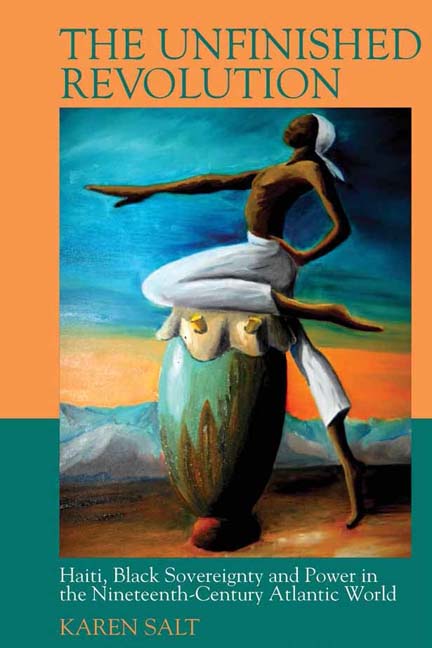 The Unfinished Revolution
The Unfinished Revolution Book contents
- Frontmatter
- Contents
- List of Figures
- Acknowledgements
- Introduction: Sovereignty and Power
- 1 Games of Sovereignty and Opportunity
- 2 Selling Citizenship, Recognising Blood, Stabilising Sovereignty
- 3 Burlesquing Empire: Performing Black Sovereignty on the World Stage
- 4 Welcome to the New World Order: Haiti and Black Sovereignty at the Turn of the Century
- 5 Sovereignty under Siege? Contemporary Performances of Black Sovereignty
- Bibliography
- Index
Introduction: Sovereignty and Power
- Frontmatter
- Contents
- List of Figures
- Acknowledgements
- Introduction: Sovereignty and Power
- 1 Games of Sovereignty and Opportunity
- 2 Selling Citizenship, Recognising Blood, Stabilising Sovereignty
- 3 Burlesquing Empire: Performing Black Sovereignty on the World Stage
- 4 Welcome to the New World Order: Haiti and Black Sovereignty at the Turn of the Century
- 5 Sovereignty under Siege? Contemporary Performances of Black Sovereignty
- Bibliography
- Index
Summary
Periodising modern black politics […] will require fresh thinking about the importance of Haiti and its revolution for the development of [black] political thought and movements of resistance.
Paul Gilroy, The Black Atlantic, 17Paul Gilroy's The Black Atlantic contains only a few lines about Haiti. In a text sharply concerned with articulating the after-effects of displacement and dislocation for people of African descent in the Atlantic world, Gilroy’s turn to and away from Haiti is both startling and intentional. As seen in the lines above, while Gilroy's text might eschew a focus on national particularities, he clearly understands that any construction of black political thought must engage with Haiti, the nation and its revolutionary beginnings. Gilroy pushes for this recognition but turns his lens in The Black Atlantic to chronotopic rhythms and supranational connectivities—such as the dispersals and displacements of Atlantic racial slavery—that have shaped African Atlantic peoples.
Yet, the above goes further than merely calling for more scholarship on an understudied nation-state. Gilroy's assertion that periodising modern black politics requires fresh thinking about Haiti makes clear that politics for those within the black Atlantic resides not merely in transnational radical antislavery movements or circulating geographies of black resistance, but also in the presence and continued reality of black nation-states. This stress and opening stands out in a text that argues against reducing blackness to a reductive national identity. While a laudable and important call, the rest of The Black Atlantic leaves unaddressed Gilroy's demand for fresh thinking about a self-avowed nation-state that emerged from years of bloodied struggle in 1804 as the first republic of people of African descent, the second republic in the Americas and the only nation successfully to emerge from a slave rebellion. As the epigraph above shows, understanding the political routes—and roots—of people of African descent in the Atlantic world means returning to nations—and specifically Haiti—in order to reassess black politics by placing Haiti at its centre. In the 25 years since Gilroy offered up this challenge, critics have responded with a variety of reassessments of Haiti and its revolution that illuminate the vitality of studies into black power, radical antislavery movements, resistance and Haitian history—and the fresh thinking still needed on black nation-states.
- Type
- Chapter
- Information
- The Unfinished RevolutionHaiti, Black Sovereignty and Power in the Nineteenth-Century Atlantic World, pp. 1 - 58Publisher: Liverpool University PressPrint publication year: 2019
